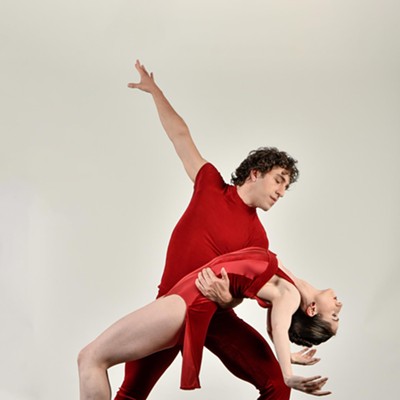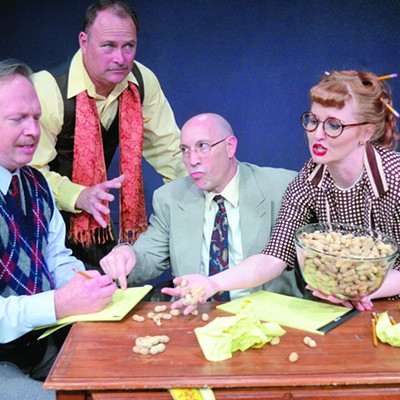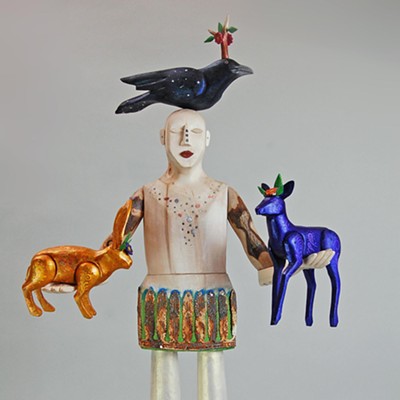Thursday 6
BELLY-UP. What makes a mammal, weighing in at the "ton" level, suddenly beach himself on the surf's edge?
Members of the UA's Marine Awareness and Conservation Society (MACS) offer their guess (probably a well-researched and educated one) as to why whales beach themselves. Add your ideas or just hear what the MACS folks have to say. Their presentation and the discussion start at 7 p.m. at Borders, located at 4235 N. Oracle Road. Next Thursday, March 13, at 7 p.m., they show up again at Borders at Park Place Mall on Broadway Boulevard.
It's free, as is the coffee. Call with questions at 292-1331.
Friday 7
THE DRAMA OF OBJECTS. Aaron Siskind was deemed a maverick in the world of photography. "For the first time in my life, subject matter, as such, had ceased to be of primary importance," he revealed in a 1945 statement about his work published in the magazine Minicam Photography. "Instead, I found myself involved in the relationships of these objects."
With modernist aesthetics like these, his pictures turned out to be deeply moving and personal experiences. His abstract images confounded critics, but greatly influenced other photographers and drew people to his photophilic "canvases."
In honor of what would have been his 100th birthday, the Center for Creative Photography--home to the Aaron Siskind Archive and one of the numerous sites participating in the national Centennial celebration--offers a glimpse at the artist's oeuvre. Works in the exhibition range from Siskind's 1930s photographs of landscape details to the minimalist realism of the 1980s lava and tar photographs. It also includes his series from Gloucester and Martha's Vineyard, his exploration of such diverse geographies as Chicago, Providence and Mexico and his "Homage to Franz Kline" series--a quintessential abstract painter if there ever was one. CCP's archive of Siskind's personal effects includes letters, clippings, magazines, poetry and other writings. On display along with these is a 1983 video yielding an intimate look at the artist's philosophy and methods.
The Drama of Pictures opens tomorrow and runs through July 6. Tonight, Guest Curator Sheryl Conkelton talks about how she organized the exhibition around the evolution of Siskind's aesthetic with his persistent interest in flat surfaces and shallow spaces, his painterly photography. The opening reception goes from 5 to 7 p.m. Conkelton's presentation begins at 6 p.m. in the gallery. CCP is located in the arts courtyard east of Speedway Boulevard and Park Avenue. All events are free. The gallery is open Monday to Friday, 9 a.m. to 5 p.m. and weekends from noon to 5 p.m. Call 621-7968 for more information.
PART KIVA MURAL, PART PICASSO. Michael Kabotie is known for his experiments in painting. In King, for example, he uses a simple playing card layout as the foundation for the painting, but then he adds Hopi pottery and textile motifs to the flat surface.
Kabotie began studying art with his famous father, Fred Kabotie, who was the first Hopi easel painter to achieve national recognition. Kabotie, the son, has found fame in his own right. He was invited to participate in the UA's Southwestern Indian Art Project with other, now-famous Native artists such as Fritz Scholder, Helen Hardin and Charles Loloma. In 1973, Kabotie co-founded Artist Hopid, a group of five painters supporting each other in their experiments with traditional art forms.
Today, Kabotie produces prints in lithography, serigraphy, etching and embossing. He's begun a series of collaborative paintings with Celtic artist Jack Dauben. At 7:30 tonight, Kabotie talks about his art on display in the Arizona State Museum's current show, Connections Across Generations. The lecture takes place at the Center for English as a Second Language auditorium, located one building northeast of the museum (which is just east of Main Gate at University Boulevard and Park Avenue). A reception and exhibition viewing follows at the museum. Admission costs $8 general, $5 museum members, free to all students. Tomorrow from 1 to 4 p.m., Kabotie teaches a drawing class for children, 7 to 16, a creative writing class with Navajo poet Sherwin Bitsui and a chalk mural drawing class. For details, call 626-2973.
FUSION SCIENCE. It started as an experiment in the studio between a tabla player and a percussionist, not unlike how a chemist churns elements together in the lab. Tabla Beat Science has since evolved into a grouping of artists and explorations of new, rhythmic fusions.
What emanates from the tabla--an Indian instrument with the twangy drone--mixes with the percussive beat of drums. Blend in African vocals, modern electronics, low-end dub bass and DJ breakbeats and you have a unique sound. "It's a genuine fusion that pours energy into the air, pauses to meditate and then rushes forward again,"raves the New York Times.
UApresents brings Tabla Beat Science to Centennial Hall at 8 p.m. tonight. The players include a star-studded lineup: Indian-born tabla maestro Zakir Hussain, bassist and producer Bill Laswell and Brooklyn-based drummer and producer Karsh Kale. Joining them are Ejigayehu Shibabaw, a young Ethiopian singer, vocalist Pandit Ganesh Iyer, DJ Disk from San Francisco and Sultan32, known for his musical mixes of Arabian electronica, salsa, drum 'n' bass and dancehall.
Tickets cost $16 to $38 with half-price student discounts. There's a free Arts Encounter at 7:15 p.m. at the Social Sciences auditorium, adjacent to Centennial Hall which is located at 1020 E. University Blvd.
Call 621-3341 for tickets or more information.
Saturday 8
THUNDERING DRUMS. If you've ever witnessed a performance of taiko (perhaps Odaiko Sonora, Tucson's own drumming ensemble), you've probably felt the energy at each thwack landing on the bulbous barrels. The pulsing rhythm mesmerizes. It's amazing to watch a group of drummers choreograph the intoxicating acoustic experience.
Imagine what it's like to create the thunderous sounds of taiko yourself. This weekend, you have a chance to learn drumming from a master when Tiffany Tamaribuchi arrives in town to teach basic and intermediate taiko drumming.
Tamaribuchi founded Sacramento's Taiko Dan. She's the winner of the 2002 All-Japan Odaiko Championship and one of the most popular workshop leaders for the North American Taiko Conferences. She teaches an energy-efficient way to hit the drum that produces that big sound with little body strain. You may also learn a thing or two about focus, relaxation and simply breathing.
Two basic sessions take place today from 9 a.m. to 1 p.m. and from 2:30 to 6:30 p.m. They are open to those with no drumming experience. The intermediate session starts at 1 p.m. tomorrow and goes until 5 p.m., and is open to those with a year of drumming under their belt (taiko or other styles). Each session costs $60 and takes place at Zuzi's Little Theater in the Historic Y, 738 N. Fifth Ave. Drums and sticks are provided. Sign up early as space is limited. Call 327-1228 to register.
LOOK UP TO THE SKY FOR THE STORY. We're lucky out here in the desert to have such a big, clear sky most nights for stargazing. Imagine how long Southwest inhabitants have been looking up to tell stories of the Big Dipper, Jupiter and Saturn.
Native American storyteller Gerard Tsonakwa weaves tales about many of the planets visible in the night sky. He's a member of the Abenaki Nation in Quebec, Canada. He's also an author, artist and amateur astronomer.
Hear Tsonakwa's hour of tales beginning at 7:30 p.m. Then look skyward at the stars, with your bare eyes or through the telescopes, at Biosphere 2 Center. Columbia University's Arizona campus is located north of Oro Valley, out beyond the city lights.
Admission for stargazing costs $10 for adults and $5 for kids, 6 to 10 years old. Dine at the Cañada del Oro Restaurant and stargazing is free. Dinner is served from 4 to 7:30 p.m. Call 838-6200 for dinner or overnight hotel reservations and directions to the B2C.
Sunday 9
LOOK BACK IN TIME FOR THE TRUTH. There's no shortage of militarism in the air these days. And it's not like our generation invented war, either.
Militarism and Peace: Then and Now is more than a panel discussion about the history of belligerent actions. Playwright Clare Coss reads from her one-character play, Lillian Wald: At Home on Henry Street. The play remembers Wald's founding of the Henry Street Settlement House and Visiting Nurse Service in New York, as well as her 1916 peace delegation to President Wilson to urge U.S. neutrality on the eve of World War I.
Coss' reading is followed by a discussion with the audience about the importance of Wald's message to present-day concerns for peace and security in the world. Among the panelists of historians, professors and journalists is Blanche Weisen Cook, biographer of Eleanor Roosevelt.
Celebrate International Women's Day along with hosts of the event--the Women's International League for Peace and Freedom and the Unitarian Social Action Committee. The WILPF benefit begins at 2 and goes until 5 p.m. at the Unitarian Universalist Church, located at 4831 E. 22nd St. Admission at the door costs $20 for WILPF and Social Action Committee members and $25 for general audiences. There are a limited number of scholarships. Call for details at 908-9269.
ALL THAT JAZZ. Think you can handle a week of jazz concerts? UA's School of Music and Dance plays host to six nights of continuous jamming.
Start with Quite a Night O' Dixie tonight, featuring performances by The Olive Street Stompers, The Original Wildcat Jazz Band and Jazzberry Jam. Tomorrow, faculty artists join forces in a concert with Kelland Thomas on sax, Tom Ervin on trombone, Robin Horn on percussion, Jeff Haskell on piano and guest artist Ed Friedland on bass.
Later in the week, there's a concert featuring Vocal Ease--the six-voice, all-female ensemble--and Every Man Jack and Jill, a mixed-voice quintet; the debut performance of a 17-member studio jazz ensemble; and a CD release concert by Park Avenue Records, one of only three university student-run record labels in the country.
All concerts take place at 7:30 p.m. at Crowder Hall in the Music Building located in the arts courtyard east of Speedway Boulevard and Park Avenue. Ticket prices range from $4 to $10. Concerts continue through March 14. For tickets or more information, call 621-1162.
Monday 10
THAT DARN FLYING BUNDLE OF GAS. After four decades of comet searching, what have astronomers learned?
Find out at the Steward Observatory's regular series of lectures. Tonight, Dr. David Levy offers details on what 40 years of research on comets darting across the sky has revealed. The free lecture starts at 7:30 p.m. at the observatory located at 933 N. Cherry Ave. in Room N210. Following the presentation, take a look at the night sky--weather permitting, of course--through the 21-inch telescope at the Campus Station.
It's all free and open to the public. Call 621-5049 with questions.
Tuesday 11
WARNING. It's still one of the most controversial subjects around, despite being sanctioned by the Supreme Court some 30 years ago.
On display at the Joseph Gross Gallery at the UA Fine Arts Complex are two shows that explore reproductive, civil and welfare rights.
Warnings was created by multimedia artist Lisa Link. Rather than focusing on the risks fertile women have gone through both before and after Roe v. Wade as two other artists in an accompanying gallery show have, Link offers a series of computer photomontages and a video that explore the threats to women's rights today and the parallel erosion of these rights in Nazi Germany. If you can imagine, she does it with a sense of humor.
Link explains her 10-year project that has landed more than 40 digital images on the walls of the gallery. Her discussion gets underway at 7 p.m. in Harvill Hall, room 305, located at Second Street and Olive Avenue just east of Park Avenue. The lecture is free and open to the public.
For questions, call the UA's Department of Women's Studies at 621-7338.
Wednesday 12
THEY WERE RUTHLESS. In 1306, amid the religious fervor of the Crusades, the entire Jewish population was kicked out of the kingdom of France.
William Chester Jordan, director of Princeton's Medieval Studies program, unfolds the exile experiences of the refugees in those lands where they took up residence at the dawn of the 14th century. In particular, he draws on the substantial corpus of poetry produced in these exile communities.
Jordan has focused his studies on Jewish-Christian relations, manumission of serfs, women and credit, the Crusades and famine. You could easily notice the parallels to our contemporary world.
His lecture starts at 7:30 p.m. at UA's College of Law, 1201 E. Speedway Blvd. at Mountain Avenue in room 146. It's free and open to the public. For more information, call 621-1284.







